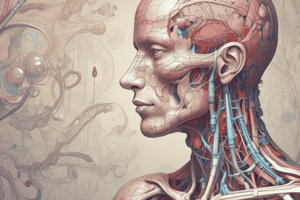Podcast
Questions and Answers
What is biology?
What is biology?
The scientific study of living systems.
What are neurons?
What are neurons?
Specialized cells that communicate with each other in the brain.
Why is understanding neural circuits important?
Why is understanding neural circuits important?
To explore human cognition, behavior, and potential therapies for neurological disorders.
What does molecular biology study?
What does molecular biology study?
What revolutionary genetic editing technique has transformed genetic studies?
What revolutionary genetic editing technique has transformed genetic studies?
What are cells?
What are cells?
What do evolution and ecology study?
What do evolution and ecology study?
What are microbiology and immunology subfields of?
What are microbiology and immunology subfields of?
What do developmental biology and stem cell research explore?
What do developmental biology and stem cell research explore?
What do computational biology and bioinformatics apply computational methods to?
What do computational biology and bioinformatics apply computational methods to?
What is the role of peroxisomes in cellular metabolism?
What is the role of peroxisomes in cellular metabolism?
What do biology strives to answer?
What do biology strives to answer?
Study Notes
Discovering the Wonders of Biology
Biology, the scientific study of living systems, is a rich and diverse field that continues to reveal new insights and breakthroughs. From the microscopic world of cells and molecules to the vast complexity of ecosystems, biology encompasses a broad spectrum of topics and subdisciplines, each contributing to our understanding of life and its processes.
The Cellular Level
At the heart of life lie cells, the fundamental units of structure and function. Neurons, for example, are specialized cells that communicate with one another to facilitate decision-making in the primate brain. Cells also communicate through molecular signaling to regulate complex processes such as development, metabolism, and immune responses.
Decision-Making and Neural Processing
Research into the brain's complex decision-making processes helps elucidate the neural circuits involved in sequential evaluations of options, deliberation, and action planning. Understanding these mechanisms is vital for exploring human cognition, behavior, and potential therapies for neurological disorders.
Molecular Biology and Genetics
The study of molecular biology and genetics provides a deep understanding of the molecular basis of life, from the genetic code to the proteins and cellular pathways that carry out the processes of life. Techniques such as CRISPR/Cas9 genetic editing have revolutionized the ability to manipulate and study genetic material.
Evolution and Ecology
The study of evolution and ecology explores the mechanisms that drive the diversity and distribution of organisms in their environments. From the vast ecosystems of the Amazon to the microbial interactions in Antarctic environments, biology seeks to understand the complex relationships among species and the factors that shape their survival and success.
Microbiology and Immunology
Microbiology and immunology are subfields of biology that study the microorganisms that inhabit our planet and the immune systems that defend against them. These intertwined fields have led to groundbreaking discoveries such as the role of peroxisomes in cellular metabolism and the human genetic diseases they produce.
Developmental Biology and Stem Cells
Developmental biology and stem cell research explore the processes that produce the diverse array of cell types and structures that make up living organisms. The study of stem cells has led to promising applications in regenerative medicine and the potential to replace damaged or diseased cells and tissues.
Computational Biology and Bioinformatics
Computational biology and bioinformatics apply computational methods to the analysis of biological data. These approaches have enabled the rapid accumulation and analysis of data from genomics, proteomics, and metabolomics, leading to a deeper understanding of biological systems and processes.
Conclusion
Biology remains a vibrant and dynamic field that continues to expand and evolve. With each new discovery, the world of biology sheds light on the complexities of life and provides new insights into the processes that sustain and shape living systems. Whether through molecular biology, genomics, or the study of ecosystems, biology strives to answer the fundamental questions of life and explore its vast and diverse realms.
Studying That Suits You
Use AI to generate personalized quizzes and flashcards to suit your learning preferences.
Description
Delve into the diverse and intricate realm of biology, from the cellular level to ecosystems and beyond. Learn about decision-making in neural processing, molecular biology, evolution, microbiology, stem cells, bioinformatics, and more.




